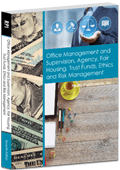This article is part of an ongoing series covering violations of real estate law. Here, the Department of Real Estate (DRE) restricted the California real estate license of a broker who engaged in dishonest dealing with clients, committed trust fund violations and failed to adequately supervise.
In December 2021, the California Department of Real Estate (DRE) restricted the license of a broker since 2003 operating out of Arroyo Grande, California. The decision became effective February 2022.
The broker was the designated officer of a brokerage firm offering property management services. As of January 2022, the property management company voluntarily surrendered their license as a result of the DRE’s investigation.
In July 2018, the broker entered into a property management agreement calling for him to manage an owner’s residential rental property in Arroyo Grande, California. In exchange for his services, the owner agreed to pay the broker a fee in the amount of 5% of the collected monthly rent.
The property management company conducted services for approximately one year. The responsible licensees included a licensed real estate agent and her employing broker.
In August 2019, the owner asked the property management company to provide:
- delinquent rental income distributions;
- late or missing monthly owner’s statements; and
- records of lease negotiations with a tenant who rented a unit in the property.
The owner’s requests were ignored.
After failing to receive the requested documents and funds, the owner terminated the property management agreement. Further, the owner requested the property management company provide numerous further documents and funds associated with the employment to a new property manager hired by the owner, including:
- complete lease files;
- accounting records;
- invoices;
- correspondence;
- property keys; and
- trust funds.
The property management company supplied just a portion of the requested records and documentation though not all. Primarily, they retained accounting records and the trust funds belonging to the owner.
The property management company’s conduct constitutes fraud or dishonest dealing under real estate law. [Calif. Business & Professions Code §10176(i)]
As a result, the broker and salesperson’s licenses are subject to suspension or revocation. [Bus and PC §§10177(d), 10177(g), 10177(j)]
Compounding matters, the broker and salesperson also engaged in a similar pattern of dishonest dealing with a second property management agreement in Pismo Beach, California between November 2018 and August 2019.
Here, the same pattern occurred. The broker and agent failed to provide the property owner with requested rent distributions and monthly owner’s statements. As a result, the broker received a termination notice requesting the return of documents, keys and trust funds from the property owner.
The broker and their agent failed to return those items despite acknowledging that they would.
Further, the Secretary of State (SOS) suspended the property management company’s ability to operate as a business in April 2019, though Red Door continued to engage in property management activities, including but not limited to the services performed on behalf of the Arroyo Grande and Pismo Beach owners — a violation of real estate law. [Bus and PC §10177(f)]
Probation, disbarment, revocation or any other disciplinary action taken against a licensee from another licensing entity or authority of the state may raise red flags to the DRE. Thus, licensees need to timely report these circumstances to the DRE. [Bus and PC §10186.2]
Related article:
In September 2020, the DRE served the broker and the property management company a subpoena requesting they provide all trust funds and accounting records on file between July 2017 and January 2020.
The broker responded that he never kept or maintained any property management records, thereby violating the broker requirement to retain such copies for three years. [BPC §10148]
Overarching all of this, as designated officer, the broker failed to adequately supervise all activities of the agent and the company, thus demonstrating a willful disregard of real estate law and regulations. [Bus and PC §§10177(d), 10177(g), 10177(h), 10159.2; DRE Regulations §2725]
The broker has the ability to retain a restricted license provided he covers the investigation and enforcement costs incurred by the DRE of $3,628 and successfully passes the DRE’s professional responsibility examination covering the legal codes and regulations governing a California real estate license.
Related page:
Maintain compliance by maintaining files
A broker employing agents is required under the DRE’s supervisory scheme to reasonably supervise sales agents’ activities.
Reasonable supervision includes establishing policies, rules, procedures and statements to review and manage:
- transactions requiring a real estate license;
- documents having a material effect upon the rights or obligations of a participant to the transaction;
- the filing, storage and maintenance of documents;
- the handling of trust funds;
- advertisement of services that require a license;
- sales agent’s knowledge of anti-discrimination laws; and
- reports of the activities of the sales agents. [DRE Regs. §2725]
To carry out their supervisory responsibility to review documents and maintain files, the broker may employ other licensees, such as an office manager or transaction coordinator. The review of documents and file maintenance is not just a mechanical function. It comprises a meaningful review of the activities of every employed licensee. [See RPI e-book Office Management and Supervision, Chapter 3]
Related Video: A Broker’s Use of Supervisors
Click here for more information on supervision requirements.
Although that covers the office management and file maintenance side of compliance, a critical component of carrying out real estate activities involves maintaining proper licensing.
A real estate brokerage operating under DRE regulations is not allowed to engage in real estate brokerage activities when their business is not in good legal standing with the California Secretary of State. [DRE Regs. §2742]
Related article:
A broker who fails to maintain records also fails to adequately supervise. One mistake bleeds into the next.
Likewise, carrying out fraudulent activities demonstrates negligence and incompetence. It displays a willful disregard of real estate law. These violations are all grounds for revocation or suspension in itself. [BPC §§10177(d), 10177(g), 10177(j)]
When one thing goes amiss, and compliance falls out of check, it often leads to other violations. Thus, real estate brokers can avoid such mishaps by ensuring their management responsibilities are at a minimum of what is required by state laws and regulations. [See RPI e-book Real Estate Practice, Chapter 1]
When the employing broker becomes too busy to provide continuous oversight over all the licensees, they may employ a licensee to act as an office manager. [DRE Regs. §2724]
The employing broker and their office manager review documents for unacceptable or incorrect activity and take necessary steps to correct any errors in a timely manner.
While most supervisory responsibilities may be assigned to an office manager, the agency duty the broker owes clients in transactions handled by employees may not be delegated to others. [Barry v. Raskov (1991) 232 CA3d 447]
When compliance in one area slips, it gives way for second and third violations (and more). More than anything, real estate professionals need to know and understand the law that governs their profession — and through their actions, respect it.
Related article:
Brokerage Reminder: Branch office managers share responsibility for oversight and management
Want to learn more about broker oversight and compliance? Click an image below to download the RPI books cited in this article.
















